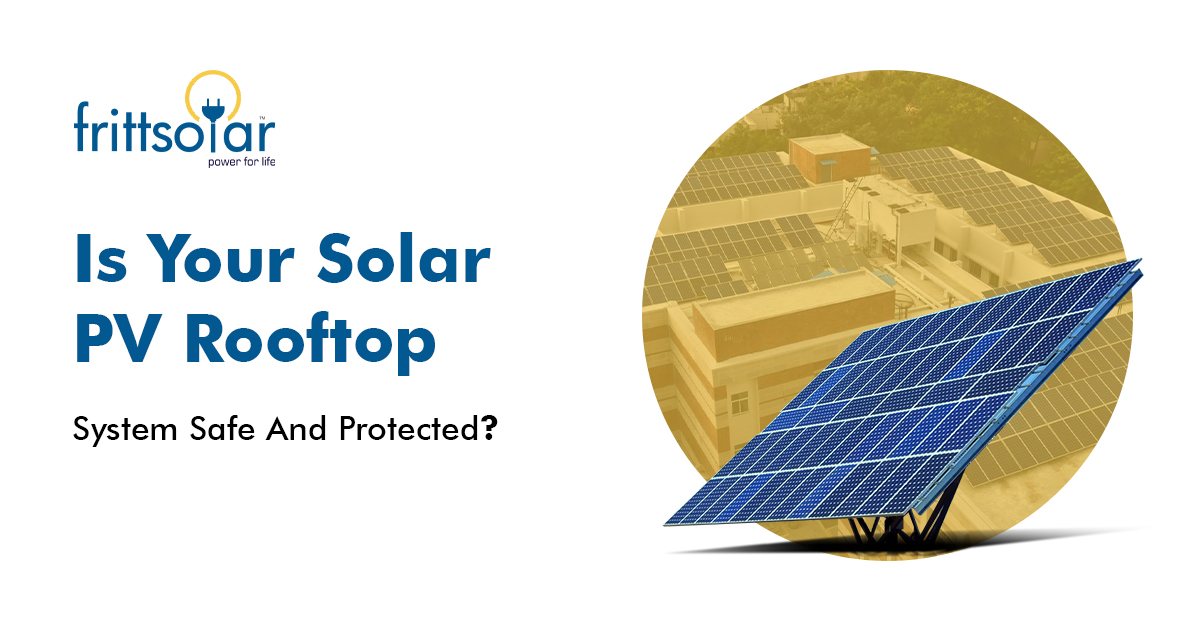

In the past few years, the use of solar photovoltaic systems has increased. This has led to an increase in the number of installations being carried out.
It’s important that all installers are aware of some basic practices as they can help reduce the risk of accidents that may occur during installation.
The most common hazards associated with solar PV installations include electrical and fire hazards. These may cause serious injuries or even death if not taken seriously into consideration during installation.
Steps to see that your solar rooftop system is safe and protected:
Design Stage
When designing a solar array, there are a number of safety considerations that should be taken into account.
Safety issues can arise from many different aspects of the design process. For example, the materials used in a solar panel must be chosen carefully to avoid any risks. They must also be properly installed and maintained.
When choosing materials for your solar panels, there are several things you need to consider. First, make sure that all materials used have been tested for safety and do not contain any toxic chemicals. Secondly, make sure they are durable enough to withstand any weather conditions they will encounter while in use. This means choosing materials that can withstand high heat and moisture without cracking or falling apart. Finally, make sure your chosen materials are easily accessible so they can be replaced when needed without too much hassle on your part.
Installation Stage
Solar panels are a great way to reduce your carbon footprint and save money on your energy bill. However, if you're installing solar panels in your home or business, there are some safety considerations you should take into account.
Solar panels generate heat as they produce electricity, which means they can pose a fire risk if they are not installed correctly. The best way to prevent this is by using high-quality insulation around the solar panel and making sure that it is installed in an area where there is good ventilation. If you do have any questions regarding the installation process, it's best to consult with a professional installer who can help guide you through the process safely.
Solar panels also require special care during their lifespan—especially when it comes to cleaning them. Avoid using power washers or high-pressure water hoses on solar panels because these types of equipment can damage them over time and cause them to crack or break apart more easily.
System In Adherence To Photovoltaic Codes.
Installation of photovoltaic systems should be in adherence to the electrical codes to ensure safe installation and maintenance of these systems. Photovoltaic systems are a part of the power grid, and therefore regulated by NFPA 70, which covers all aspects of electrical safety. Labelling and signage are important requirements covered by electrical codes. Inverters, conduits, circuit breakers, and other electrical equipment should all be clearly labeled. These electrical codes must be followed during installation.
In addition to photovoltaic codes, there are building and fire codes that must be followed when installing solar panels. Building codes help regulate materials used in the installation process as well as installation practices such as proper grounding and load testing for the safe installation and operation of solar PV systems. Fire codes help ensure that fire protection measures are followed during installation so that all electrical wiring meets local standards for safety purposes.
Wind Protection
When installing solar panels, it is important to consider wind loading. This is a term used to describe the stress on a structure caused by wind. The higher the wind speed and the longer the time period in which it blows, the more likely it is that you will experience wind loading. If your solar panel system is not properly secured against wind loading, then it may be damaged or even destroyed as a result.
Wind loading can cause serious damage to your solar panel system if you do not take steps to prevent it. The best way to protect your system from wind loading is by using a high-quality anchor system for each panel so that they are attached securely to their supports.
Equipment Specifications And Warranties
Solar panel systems are an investment in your home that can save you money on your power bills and bolster the value of your property, but they're not all created equal.
When deciding on a warranty for your solar panel system, there are numerous factors to consider. This includes your installer's workmanship as well as the labour and parts they used, as well as the inverter(s), battery, and solar modules themselves of which meet the desired requirement of a reasonable power output over the entire life of the system and ensure the initial return on investment.
The most important thing is to choose an installer with a proven track record for quality workmanship, who uses quality products and materials so that you get what you pay for—a reliable system that will last for decades!
Lightning And Surge Protection
Installing a solar panel system on your roof is an exciting prospect, but it can also be intimidating. It's important to be aware of the risks involved and how to protect yourself from them.
Lightning and surge protection for rooftop PV systems are especially important because they can help you avoid costly damage to your system. A lightning strike will often cause damage not just to the panels themselves but also to other components that are connected to them, like inverters and battery banks. If this happens, you'll have to replace all of these components, which could cost thousands of dollars—and that's if everything still works!
A surge protector uses a metal oxide varistor (MOV) component to divert excess voltage away from sensitive electronics like computers or phones. When lightning strikes, it sends a large amount of electricity over a very short distance (called a "short circuit"), which can damage or destroy unprotected devices. MOVs can protect against these surges by reducing the voltage sent through them by as much as 90%. This protects expensive electronic equipment like computers or televisions from being damaged during storms or power outages, so they're ready when needed most!
If you are thinking about installing solar panels on your home or business property, it's important that your contractor be qualified to do so. If not, you could be putting yourself at risk for serious injury or even death if something goes wrong with the installation process.
Frittsolar, one of the top solar system company in India have helped thousands of customers successfully install solar panels on their homes and businesses throughout India. Their team is dedicated to providing their customers with quality service while ensuring their safety at all times during the installation process.
When you're looking for an experienced and safe installation of solar panels, choose Frittsolar. They offer a wide range of services, including installation, maintenance and repair of solar panels.